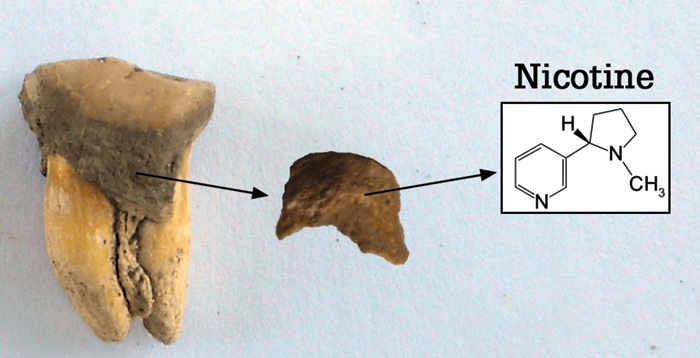In an attempt to track early tobacco use across the Americas, a group from Washington State and University of California, Davis, have identified nicotine residue from the teeth of ancient tobacco users for the first time. “Plaque has largely been ignored by archaeologists in the past because the amount of plaque on the teeth tends to be small – and it simply wasn’t possible to analyze such small samples,” explains anthropologist and first author of the paper, Jelmer Eerkens (UCD). But improvements in instrumentation that offer greater sensitivity have helped to solve this problem (at least for ancient plaque), even allowing characterization of proteins, bacterial DNA and plant fibers. In this case, researchers used ultra performance liquid chromatography-mass spectrometry (UPLC-MS; Waters Corporation) to analyze dental plaque (or “dental calculus”) from eight individuals across three archaeological sites in Central California to determine the presence of nicotine, caffeine and atrophine.

One interesting discovery: nicotine was found in the calculus of a middle-aged woman. Eerkens believes this tells us something about women’s roles at the time. “When anthropologists interviewed Native Californians in the late 19th and early 20th centuries, they recorded that it was mostly or exclusively men, especially those who practiced healing or doctoring, who used tobacco,” he says. “Judging by our findings, there must have been women healers and doctors as well – they just weren’t recorded by the mostly male anthropologists who happened to mostly interview men.” The work underscores the value of carrying out archaeological tests like these, he adds. “While the science of archaeology has some of its own biases, it can serve as a means to tell the stories of under-reported or under-represented communities.” They are now working with several indigenous communities to identify a range of medicinal plants other than tobacco, and are also looking for older plaque samples (from 5,000 to 10,000 years ago) to see if they can trace how far back people were using tobacco in this region.
References
- JW Eerkens et al., “Dental calculus as a source of ancient alkaloids: Detection of nicotine by LCMS in calculus samples from the Americas”, J Archaeol Sci Rep, 18, 509–515 (2018).




